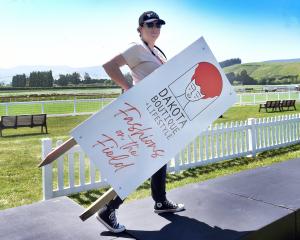Club sport still takes place in most towns and cities around New Zealand every day. Clubs once stitched the community together but are they fraying around the edges?In the opening part of a short series, reporter Adrian Seconi checks the pulse of some Dunedin clubs and finds times are achanging at a very rapid rate.
Everything was better in the 1980s.
The music.
The fashion.
The economy.
Who did not love Dire Straits, stonewashed denim and the unadulterated greed neoliberalism inspired?
Well, the weekends were definitely better.
There was no internet, nothing was open and Saturdays were set aside for sport.
Going back to the clubrooms afterwards is just what people did.
You probably drank too many very reasonably-priced beers and then drove home listening to Bat Out of Hell on your radio cassette player.
These days, if people pop into the club afterwards it is for "crisps and lemonade''.
Society has changed and some clubs are feeling the pinch.
Take Caversham Association Football Club, for example.
The club scooped most of the major silverware on offer this season, but in spite of all its on-field success, the club is struggling to keep up with the bills.
Early last year, it was forced to take out a $10,000 loan or risk of being expelled from the league.
It hiked its membership fees from $150 to $250 this year and has looked for ways to cut expenses.
In August, club president Steve Fleming said he was not sure "how operational'' the club would be next year and the situation remains marginal.
"We obviously need to think outside of the square because if you are forever doing the same thing, you are going to get nowhere,'' Fleming said.
"We've thought about going in with a rugby club.
"Dunedin asked us if we'd come in and just use their clubrooms ... and just sort of make it a general meeting point for everyone on a Saturday night. These are the sort of things we have to think about.''
The club may walk away from its base at Tonga Park and the clubrooms it shares with Carisbrook-Dunedin Cricket Club.
"That is something we definitely have to look at. I mean we've got a $6000 repair bill for our roof that we are just considering whether it is even worth throwing $6000 at it. What would we get back for it?"
Fleming said the clubrooms were probably only open for two or so hours each week which made it very difficult to generate enough revenue to cover the overheads.
People are not returning to the clubrooms as reliably any more, and when they do show up they might not spend as much as they once may have.
Caversham might have just 20 people return.
"We sell more crisps and lemonade than we do beer and that is just the nature of society these days,'' Fleming said in August.
But are you a club without clubrooms?
"Getting people to come back and talk about how they got on and share experiences is the whole point of playing. We need to have a meeting point.
"[But] I'd say, if in 10 years' time there is anyone at Tonga Park, well, I'd be very surprised if it is Caversham.''
North East Valley Cricket Club committee member Glen Cawood said his club had many of the same issues.
"We are like any of the other clubs. Our three main revenue streams come through the bar, subscriptions and sponsorship,'' he said.
"When we have all those functioning properly it certainly helps. But we are not a club that is financially comfortable by any stretch of the imagination.
"But we do survive and we're probably in a lot better shape than some of the other clubs around town.''
"[In my playing days] you would always go back to the club on a Saturday night,'' Cawood said.
"That was almost a given; it was not negotiable to a point.''
"Now the older ones will have something on and the younger ones maybe don't see the need or the requirement to have that debrief.
"But, in saying that, we had maybe 50 or 60 back for our opening night and we incentivise people by putting on some food ... just to entice people to come back and for the club to be their first port of call.''
Pirates Rugby Football Club has bounced back after a few lean years and it has done that by going the extra mile for its members, chairman Conrad Stedman said.
"We've been going back to basics and having functions for club members and things like that,'' he said.
"We also supply a courtesy van to transport people around. We've sort of done it [in the past] but have just made people more aware of it.
"It is hard work. The club has done all right and we have money in the bank, so we are OK.''
The key, Stedman said, was developing a good culture at the club so people wanted to return to the clubrooms.
TOMORROW: Sport Otago chief executive John Brimble on the future of club sport.













